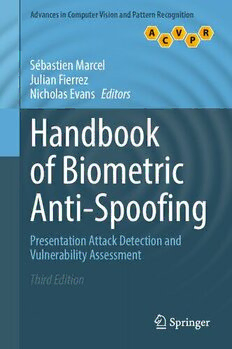
Handbook of Biometric Anti-Spoofing: Presentation Attack Detection and Vulnerability Assessment PDF
Preview Handbook of Biometric Anti-Spoofing: Presentation Attack Detection and Vulnerability Assessment
Advances in Computer Vision and Pattern Recognition Sébastien Marcel Julian Fierrez Nicholas Evans Editors Handbook of Biometric Anti-Spoofing Presentation Attack Detection and Vulnerability Assessment Third Edition Advances in Computer Vision and Pattern Recognition FoundingEditor SameerSingh SeriesEditor SingBingKang,Zillow,Inc.,Seattle,WA,USA AdvisoryEditors HorstBischof,GrazUniversityofTechnology,Graz,Austria RichardBowden,UniversityofSurrey,Guildford,Surrey,UK SvenDickinson,UniversityofToronto,Toronto,ON,Canada JiayaJia,TheChineseUniversityofHongKong,Shatin,NewTerritories, HongKong KyoungMuLee,SeoulNationalUniversity,Seoul,Korea(Republicof) ZhouchenLin ,PekingUniversity,Beijing,Beijing,China YoichiSato,UniversityofTokyo,Tokyo,Japan BerntSchiele,MaxPlanckInstituteforInformatics,Saarbrücken,Saarland, Germany StanSclaroff,BostonUniversity,Boston,MA,USA TitlesinthisseriesnowincludedintheThomsonReutersBookCitationIndex! AdvancesinComputerVisionandPatternRecognitionisaseriesofbookswhich bringstogethercurrentdevelopmentsinthismulti-disciplinaryarea.Itcoversboth theoreticalandapplied aspects ofcomputer vision,andprovides textsforstudents andseniorresearchersintopicsincluding,butnotlimitedto: (cid:129) Deeplearningforvisionapplications (cid:129) Computationalphotography (cid:129) Biologicalvision (cid:129) Imageandvideoprocessing (cid:129) Documentanalysisandcharacterrecognition (cid:129) Biometrics (cid:129) Multimedia (cid:129) Virtualandaugmentedreality (cid:129) Visionforgraphics (cid:129) Visionandlanguage (cid:129) Robotics · · Sébastien Marcel Julian Fierrez Nicholas Evans Editors Handbook of Biometric Anti-Spoofing Presentation Attack Detection and Vulnerability Assessment Third Edition Editors SébastienMarcel JulianFierrez IdiapResearchInstitute UniversidadAutonomadeMadrid Martigny,Switzerland Madrid,Spain NicholasEvans EURECOM BiotSophiaAntipolis,France ISSN 2191-6586 ISSN 2191-6594 (electronic) AdvancesinComputerVisionandPatternRecognition ISBN 978-981-19-5287-6 ISBN 978-981-19-5288-3 (eBook) https://doi.org/10.1007/978-981-19-5288-3 1stedition:©Springer-VerlagLondon2014 2ndedition:©SpringerNatureSwitzerlandAG2019 3rdedition:©TheEditor(s)(ifapplicable)andTheAuthor(s),underexclusivelicensetoSpringer NatureSingaporePteLtd.2023 Thisworkissubjecttocopyright.AllrightsaresolelyandexclusivelylicensedbythePublisher,whether thewholeorpartofthematerialisconcerned,specificallytherightsoftranslation,reprinting,reuse ofillustrations,recitation,broadcasting,reproductiononmicrofilmsorinanyotherphysicalway,and transmissionorinformationstorageandretrieval,electronicadaptation,computersoftware,orbysimilar ordissimilarmethodologynowknownorhereafterdeveloped. Theuseofgeneraldescriptivenames,registerednames,trademarks,servicemarks,etc.inthispublication doesnotimply,evenintheabsenceofaspecificstatement,thatsuchnamesareexemptfromtherelevant protectivelawsandregulationsandthereforefreeforgeneraluse. Thepublisher,theauthors,andtheeditorsaresafetoassumethattheadviceandinformationinthisbook arebelievedtobetrueandaccurateatthedateofpublication.Neitherthepublishernortheauthorsor theeditorsgiveawarranty,expressedorimplied,withrespecttothematerialcontainedhereinorforany errorsoromissionsthatmayhavebeenmade.Thepublisherremainsneutralwithregardtojurisdictional claimsinpublishedmapsandinstitutionalaffiliations. ThisSpringerimprintispublishedbytheregisteredcompanySpringerNatureSingaporePteLtd. The registered company address is: 152 Beach Road, #21-01/04 Gateway East, Singapore 189721, Singapore Foreword ItisapleasureandanhonourbothtowritetheForewordforaleadingandprestigious book.ThisistheThirdEditionoftheHandbookofBiometricsAnti-SpoofingandIwas co-editorforthefirsttwoEditions,andnowIhavebeenpromoted.(Morerealistically, IhavenotworkedinAnti-Spoofingforsometimenow.)SoIadmitbias,andIam takingtheopportunitytolookatthebookfromtheoutside.Essentially,Ishallaim tosubstantiatemyclaimthattheHandbookisindeedleadingandprestigious,andI finditnothardtodo. ThefirstevidenceIcanofferisthattheHandbookwasthefirsttexttoconcentrate onanti-spoofing.Thereappear tobenootherbooksyetwhichconcentrateonthis importanttopic,thoughitisamongthecontentofsomeandnaturallywithinthose describingthesecuritydomain.Ihavebeenprivilegedtobeinvolvedinbiometrics from its earliest days, in my case in the 1980s before the word biometrics was coined.Eventhenweknewthatifwewereworkingorwereevertoworkproperly, thenweneededtocountenancethepossibilitythatsomeonewouldtryandbreakthe system.Inmodernterminology,wedidnotconsiderthepossibilitythattheremight be spoofing or presentation attacks. In the First Edition, I, Sébastien, and Stan Li (theEditorsthen)arguedatlengthoverwhetherthebookshouldbetitled“Spoofing” or “Anti-spoofing”—and that is the nature of pioneering work: one does not even knowhowbesttodescribeit.SotheHandbook’suniquenessandinitiativestrongly underpinaclaimthatthetextisleadingandprestigious. Secondly,theevidenceconcernsthepeopleinvolved:thosewhohaveeditedthis Handbook, those who have authored its Chapters, and those who have reviewed them.SébastienMarceliswellknownforhisworkinmulti-modalityanti-spoofing, Nicholas Evans is well known for his works on speech and other biometrics, and JulianFierreziswellknownforhisprize-winningworksonfaceandsignature.All have contributed to the infrastructure this fascinating subject requires and are due manyaccoladesfortheirothercontributions.ThisisagreatteamofEditors.Thenwe findacohortofauthorswhoareleadinglightsinthistopicarea,andliketheEditors, theytoohavecontributedtotheinfrastructureandthebuildingofthistopicalmaterial. Thatthecontributorsderivefrommanyleadinginstitutionsaroundtheworldfurther v vi Foreword underpinsthesuggestionthatthepedigreeofthoseinvolvedemphasizestheclaim thatthetextisleadingandprestigious. Thethirdevidenceisthatthebook’scoverageishighlyappropriatetoleadtheway instudiesofanti-spoofing.Thecoverageincludesmajormodalities,likeFinger,Face, Iris,andVoice(notingthatvoice/speakerisoften—unfortunately—consideredwithin the signal/speech domain rather than within biometrics). There are naturally other biometrics.Inpreviouseditions,thesehaveincludedsignature,gait,andveinandtwo ofthesemaintaininthenewEdition.Therearealsomethodologicalcontributionsand thereisupdatedmaterialonstandardsandlegalissues.Thelattertwoareofenormous importanceasidentityverificationandrecognitioncontinuetopervadesocietyand enableconvenient,practicable,andsecureaccess.Sothecomprehensivenessandthe insightaffordedbytheHandbook’sstructurereinforcetheclaimtoleadershipand prestige. Therearemanyothermetricsthatfurthercontributetothisevidence.TheHand- bookhasbeenhighlycitedinitsprevioustwoEditions,andnaturally,theChapters withinithavetheirowncitationstoo.Myownstudentshaveenjoyedthebook,and manyothersdo.ThebookispublishedwithinSpringer’sexcellentseriesonbiomet- rics.Thentherearesalesandlibrarypenetration,neitherofwhichIcanassess.Thata bookreachesitsthirdEditionassuresoneofthemarketpenetrationsincepublishers willnotconsiderfurtheringtextsthathavenotprovedsubstantiallytheirvalue.Even in my biased view, I find it easy to find evidence that this book is the leading and prestigious book and a pioneering text in biometric anti-spoofing. By its content, presentation,ethos,andstyle,theThirdEditionoftheHandbookofBiometricsAnti- Spoofingmakesanexcellentadditiontothiscompellingseries.Mycongratulations toallwhohavecontributedtothis. March2022 MarkS.Nixon ProfessorEmeritus SchoolofElectronicsandComputer Science UniversityofSouthampton Southampton,UK Preface The study of Presentation Attack Detection (PAD) is now an established field of research across the biometrics community. Increasing awareness of vulnerabilities topresentationattackshascontinuedtofuelthegrowingimpetustodevelopcoun- termeasurestopreventthemanipulationandtoprotectthesecurityandreliabilityof biometricrecognitionsystems.Progresshasbeenrapid,withPADnowadaysbeing akeycomponenttoalmostanydeploymentofbiometricrecognitiontechnologyand nowstandardizedbytheISOandtheIEC. Thetremendousadvancessincethepublicationofthesecondeditionin2019are the principal reason why we decided to compile a third edition of the Handbook of Biometric Anti-Spoofing. As for the second edition, we published an open call for expressions of interest and invited updates to previous chapters in addition to entirely new contributions. The third edition is arranged in seven different parts dedicatedtoPADinfingerprintrecognition,irisrecognition,facerecognition,and voicerecognition,withtwomorecoveringotherandmulti-biometrics,legalaspects, andstandards.Likethesecondedition,thefirstfourpartsallstartwithanintroduction to PAD that is specific to each biometric characteristic. We are delighted that all four also contain a review of PAD competitions (the last being combined with the respectiveintroduction),allupdatedtoprovideanoverviewofprogressandthelatest results. New chapters feature throughout and complement updates with coverage of new detection approaches and models, multi-spectral/multi-channel techniques, multiple biometric PAD databases and solutions, and legal perspectives. The third editioncomprises21chapters.Weareextremelygratefultotheauthorsandalsothe reviewerswhohavehelpedtoensurequality.Bothauthorsaswellasreviewersare listedseparatelyherein. WewishalsotothanktheteamatSpringerfortheirsupportandespeciallyCeline Chang and Vinothini Elango who helped significantly towards the preparation of thisthirdedition.OurthanksalsotoProf.MarkNixon.Markservedasco-editorfor boththefirstandsecondeditionsbut,followinghisrecentretirement,steppeddown fromthisroleforthethirdedition.Werefusedtolethimoffthehookcompletely, however,andaredelightedthathesokindlyagreedtoprovidetheforeword.Thank youMark! vii viii Preface Weareconfidentthatthethirdeditionservesasatimelyupdateanddefactorefer- encetobiometricpresentationattackdetectionforresearchers,students,engineers, andtechnologyconsultantsalike.Likethesecondedition,anumberofchaptersare accompaniedbyopen-sourcesoftware,scripts,andtoolsthatcanbeusedbyothers toreproducesomeoftheresultspresentedinthebook.Additionalresourcescanbe downloadedfromhttps://gitlab.idiap.ch/biometric-resources.Inalmostallcases,the experimentalworkreportedwasperformedusingstandardorcommondatabasesand protocolswhichwehopewillallowandinspireotherstojointhePADefforts.PAD willsurelyremainattheforefrontofresearchinourfieldsforyearstocome.While tremendousprogresshasbeenmade,newthreatsareemergingandcallforgreater investmentstoensurethatbiometricsrecognitiontechnologyremainsbothreliable andsecure. Martigny,Switzerland SébastienMarcel Madrid,Spain JulianFierrez BiotSophiaAntipolis,France NicholasEvans March2022 List of Reviewers ZahidAkhtarINRS-EMT,UniversityofQuebec,Canada JoséLuisAlbaCastroUniversidaddeVigo,Spain AndréAnjosIdiapResearchInstitute,Switzerland SushilBhattacharjeeIdiapResearchInstitute,Switzerland ChristopheChampodUniversityofLausanne,Switzerland XingliangChengTsinghuaUniversity,China Adam Czajka Research and Academic Computer Network (NASK), Poland and UniversityofNotreDame,USA HéctorDelgadoNuanceCommunications,Spain NesliErdogmusIzmirInstituteofTechnology,Turkey NicholasEvansEURECOM,DepartmentofDigitalSecurity,France JiangjiangFengTsinghuaUniversity,China Julian Fierrez Biometrics and Data Pattern Analytics—BiDA Lab, Universidad AutonomadeMadrid,Spain JavierGalballyEuropeanCommission,JointResearchCentre,Italy AnjithGeorgeIdiapResearchInstitute,Switzerland Luca Ghiani University of Cagliari, Department of Electrical and Electronic Engineering,Italy Marta Gomez-Barrero da/sec Biometrics and Internet Security Research Group, HochschuleDarmstadt,Germany AbdenourHadidUniversityofOulu,Finland GuillaumeHeuschIdiapResearchInstitute,Switzerland IvanHimawanQueenslandUniversityofTechnology,Brisbane,Australia ElsKindtKULeuven,Belgium TomiKinnunenSchoolofComputing,UniversityofEasternFinland,Finland Jukka Komulainen Center for Machine Vision and Signal Analysis, University of Oulu,Finland KetanKotwal,IdiapResearchInstitute,Switzerland VedranaKrivokuc´aHahn,IdiapResearchInstitute,Switzerland StanZ.LiChineseAcademyofSciences,China SébastienMarcelIdiapResearchInstitute,Switzerland ix
